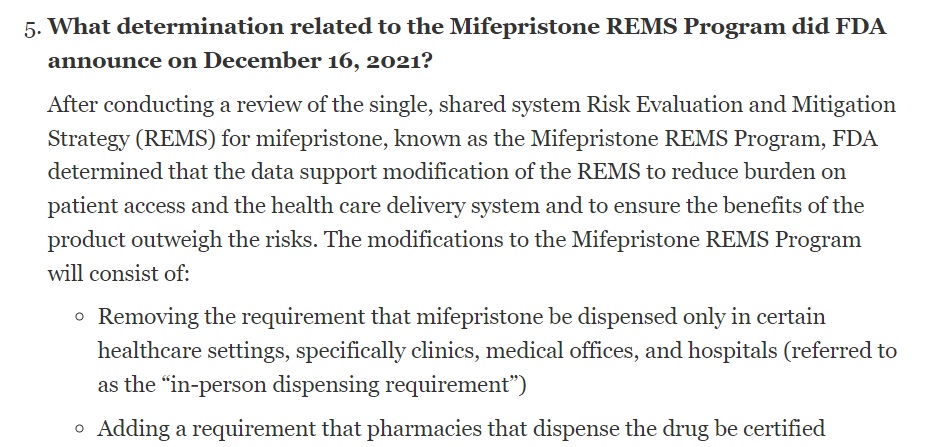The abortion pill can now be sold online and through the mail following a December 2021 modification of the Food and Drug Administration (FDA)’s safety requirements under the Risk Evaluation and Mitigation System (REMS). A limited number of drugs on the market have been placed under these safety requirements, which the FDA can put in place “for certain medications with serious safety concerns.”
The abortion pill known as mifepristone (brand name Mifeprex) was originally placed under the REMS in April 2011, due to several adverse events reports, including deaths.
Prior to today, the FDA’s REMS prohibited the abortion pill from being dispensed online or in pharmacies and required the pill to be dispensed in person in approved clinics or hospitals that could properly date a woman’s pregnancy, rule out deadly ectopic pregnancies, and offer or refer for emergency care in cases of complications or when abortion pill failures result in incomplete abortions.
This in-person requirement, however, had been placed under a preliminary injunction in July 2020 by U.S. District Judge Theodore D. Chuang, for the duration of the COVID-19 pandemic. Then in April of 2021, the Biden Administration’s FDA temporarily enabled abortion pill distribution by mail during the COVID-19 pandemic.

FDA REMS allows abortion pill by mail as of December 16 2021
The modification was posted on December 16, 2021 to the FDA’s website:
After conducting a review of the single, shared system Risk Evaluation and Mitigation Strategy (REMS) for mifepristone, known as the Mifepristone REMS Program, FDA determined that the data support modification of the REMS to reduce burden on patient access and the health care delivery system and to ensure the benefits of the product outweigh the risks.
According to the FDA, the modifications to the Mifepristone REMS Program will consist of:
-
Removing the requirement that mifepristone be dispensed only in certain healthcare settings, specifically clinics, medical offices, and hospitals (referred to as the “in-person dispensing requirement”)
-
Adding a requirement that pharmacies that dispense the drug be certified
FDA also wrote, “…[r]emoving the in-person dispensing requirement will allow, for example, dispensing of mifepristone by mail via certified prescribers or pharmacies, in addition to in-person dispensing in clinics, medical offices, and hospitals as currently outlined in the Mifepristone REMS Program. Applicants began using a mail order distribution model when the in-person dispensing requirement was not being enforced during the COVID-19 public health emergency (PHE); this distribution model remains in use today.”
BREAKING
Despite the abortion pill killing 24 mothers and 3,700,000 children,
The Biden FDA just permanently removed in-clinic dispensing requirements for abortion pills, allowing the deadly drugs to be sent by mail, prescribed by "doctors," & fulfilled by pharmacies
Horrific
— Lila Rose (@LilaGraceRose) December 16, 2021
On a separate webpage, the FDA noted, “In 2021, FDA undertook a full review of the Mifepristone REMS Program. Based on that review, FDA has determined that the REMS will include the following elements:
- Mifepristone must be prescribed by or under the supervision of a certified healthcare provider who meets certain qualifications, including signing a Prescriber Agreement Form;
- The healthcare provider must obtain a signed Patient Agreement Form from the patient after counseling and prior to prescribing Mifeprex.
- Pharmacies that dispense mifepristone must be certified.
As of the writing of this article, the FDA has not updated the REMS website, so further clarification is forthcoming.
What this indicates is that the FDA is allowing the abortion pill to now be openly sold online or through certified pharmacies, although there is little known about what that certification process involves.
Live Action president and founder Lila Rose reacted to the decision in a press release:
The trauma of an at-home abortion not only destroys the life of a preborn child and all her limitless potential, but also puts her mother at grave medical risk. Because of the FDA’s unscientific and dangerous decision today, our own U.S. Postal Service will continue to be a lethal pipeline for both women and their children. This decision will result in even more death.
According to the Center for Disease Control, 43.7% of all abortions in the U.S. were chemical abortions, with that increasing by 12.5% between 2018 and 2019. We know that over 3.7 million children and at least 24 mothers have already been killed by the abortion pill. By permanently lifting the safety requirements underage girls could order the pills online and dangerously self-abort at school or alone in their bathrooms. Or worse, predatory abusers can order the pills for them to kill their preborn babies, compounding the abuse.
The abortion industry is intentionally misinforming the public about the true consequences of a chemical abortion, and putting women and their pre-born children in danger, rather than focusing on the support and care they need.
In 2017, the American Civil Liberties Union (ACLU) filed a case (Chelius v. Becerra) to challenge the REMS on behalf of Hawaiian doctor Graham T. Chelius. Just three years later, the ACLU filed a lawsuit on behalf of the pro-abortion American College of Obstetricians and Gynecologists (ACOG) to suspend the FDA’s REMS during the COVID-19 pandemic.
In May of 2021, a motion to stay the Chelius case was enacted pending a final review by the FDA of the REMS. On November 3, a status update was filed in the case, which indicated that the “FDA… anticipates completing its review by December 16, 2021” and the stay on the lawsuit was extended until January 14, 2022 to “give the Parties time to determine appropriate next steps in this litigation.”
In a letter to the plaintiffs in the Chelius lawsuit, the FDA acknowledged, “The agency has determined that the Mifepristone REMS Program continues to be necessary to ensure that the benefits of the drug outweigh the risks. However, we have determined that it must be modified to minimize the burden on the health care delivery system of complying with the REMS and to ensure that the benefits of the drug outweigh the risks.”
While current data from the CDC indicates that nearly 44% of abortions involve use of the abortion pill, estimates indicate this could be much higher. Live Action News has previously documented the politicization of the abortion pill approval process and multiple safety concerns over expanding access to the deadly drugs.
A recent study that analyzed Medicaid data within 17 states that allow taxpayer funded abortions found that the rate of abortion-related ER visits for chemical abortions staggeringly increased 507% from 2002-2015.
The FDA has not published the data they reviewed for their conclusions, but Live Action News has documented how multiple spokespersons and study authors claiming that the abortion pill is “safe” have openly disclosed being on the payroll of abortion pill manufacturer Danco or its generic manufacturer GenBioPro, with one recently suggesting that emergency departments should consider falsifying medical documents on abortion pill complications in a potential post-Roe era.
The loosing of the REMS is tragic and will no doubt increase the use of the abortion pill, leaving even more babies at risk of death and more women at risk of abortion trauma. While it is a boon for the abortion industry, it is clearly not in the best interest for the safety of babies or their mothers.
Editor’s Note: The FDA has received reports of serious adverse events in women who took Mifeprex. As of December 31, 2018, there were reports of 24 deaths of women associated with Mifeprex since the product was approved in September 2000, including two cases of ectopic pregnancy resulting in death; and several cases of severe systemic infection (also called sepsis), including some that were fatal.
The adverse events cannot with certainty be causally attributed to mifepristone because of concurrent use of other drugs, other medical or surgical treatments, co-existing medical conditions, and information gaps about patient health status and clinical management of the patient. A summary report of adverse events that reflects data through December 31, 2018 is here.
“Like” Live Action News on Facebook for more pro-life news and commentary!







